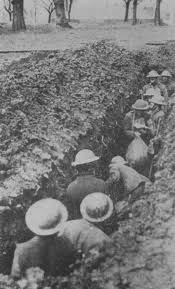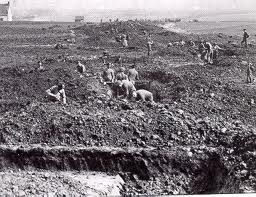



The Parish Church of St George the Martyr, Waterlooville

Easter 2015
Diaries of a First World War Bugler
I might say the Germans tried to kill us by blowing up our trenches just before we left but by bad management the mines were short of range. Although the trench escaped, a party of the K.O.Y.L.I, out working suffered heavily.
As I said before, we left Scottish wood on the 21st and marched to Reddenhurst arriving at 4 o’clock in the morning. We passed the day till 8 o’clock chiefly by sleep. At quarter past 8 o’clock we started off on the most trying 14 miles march I have ever done in the whole of my 6½ years’ service in the army. It rained the whole time, it was pitch dark and the roads were awful. At one place we had to halt for fully 20 minutes on account of transport breaking down and blocking the road. The halt was alright but we had lost time, so, to make it good we had to march for 2 hours without a rest at all and this is not easily done when you have got fully 70 lbs to carry. However, we arrived at a farm just outside Steinwoorde at 3 o’clock in the morning, wet through to the skin but, being dead beat, were soon asleep on the dry straw. The dawn broke, the rain had stopped and a strong wind was blowing; and a little later the sun shone out making a glorious day.
24th JULY 1915.
I shall never forget this day as long as I live, for my only sister was married this day. At 4 o’clock when the toast was proposed to me, I was on parade for kit inspection but my thoughts were across the sea. The next day was passed in attending Divine Service in ‘B’ Company barn this day being Sunday. On Monday, 26th, we had physical drill and Company drill. The following day we started at 10.30 a.m. for a “short route march” and landed back at 2 o’clock. In the evening I sang at ‘A’ Company's concert held at the Estaminet de la Gare, Steinwoorde. Captain Holmes being in the Chair, I was well applauded for my rendering of “Reuben Kanzo” and was asked by special request, (Mr. Holmes), to sing “Moira my Girl”, with which I took them by storm.

To mark the 100th anniversary of the outbreak of World War I, we are continuing the serialisation of the diaries of Bugler John McCormack -
28th JULY 1915.
Today we rose at 5 o’clock for the purpose of proceeding to the baths but, alas, they did not open till 8 o’clock, so we stormed the one and only shop open for cafe au lait. That with bread and bullie went down very well. The following day to this saw us off to the station, a five mile trip. Having entrained we settled ourselves down for a 12 hour journey. It was a lovely day and one I shall always remember for suddenly someone cried “The Sea!” All heads were turned towards the same spot. There, sure enough, was our one and only way to good old England. We followed the coast for some time until we arrived at Calais. Here it was I spoke to the first English girl for nine months. After singing a few farewell songs, we left Calais all feeling very down in the dumps. Our destination was reached at last at ¼ to 12 o’clock p.m., Corbie by name. We had a most beautiful billet with a river which joins the Aisne running along the back of the house. A rowing boat was at our disposal. We had a fine time and it was with much groaning that we moved off to this place named Ribement-
4th AUGUST 1915 proclaims the 1st year of this Great War. I kept this day up by having a chicken for supper.
After supper we had to march off to a place called Bray. This is a small village which luckily has not been shelled. Here we took over the bugles again for the purpose of doing aeroplane duty. I was the first English bugler that has ever sounded a bugle in this place. This brings me to the 10th August.
JULY 1st 1915 still sees us in Scottish Wood carrying on as usual; -

23rd AUGUST 1915.
Today still finds us in Bray where we, the buglers, have been instructing Kitchener’s men, the 7th Royal West Kents and the Buffs, in aeroplane patrolling. At exactly 11.30 a.m. this morning the Germans started bombarding the town for the first time. Luckily all the shots were “wide” and only helped to put us on our mettle.
25th AUGUST 1915.
Today the boys come out of the trenches for a rest all wishing it was dear old “Blighty”. The so-
